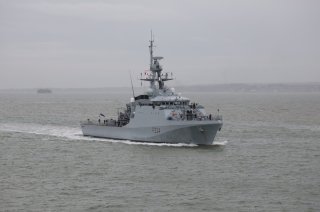Don’t Embolden Venezuela Over Guyana
Despite recent talks, Venezuela has not been reprimanded for its brazen attempts to violate international law.
Last week, the Royal Navy’s HMS Trent appeared off the coast of the South American nation of Guyana. While the vessel arrived for routine training with the Guyanese military, its presence served to ward off threats to Guyanese sovereignty, particularly Venezuelan president Nicolas Maduro’s stated desire to absorb the Essequibo region in the country’s western reaches.
On December 3, Maduro conducted a referendum with small turnout that approved the annexation. Likewise, he appointed a governor for the future seized territory. Two days earlier, the International Court of Justice (ICJ) ordered Venezuela to “refrain from taking any action” to change the status quo in the Essequibo region.
Most probably, Maduro intends to regain popularity by appealing to Venezuelan nationalism and instigating an international conflict in the same way that the Argentinian military junta did in 1982 when it invaded Britain’s Falkland Islands. In both cases, the governments of Argentina and Venezuela suffered from a deep legitimacy and governance crisis. In the case of Venezuela, Maduro is very concerned with the high participation of Venezuelans in the primary elections and the overwhelming victory of Maria Corina Machado, a candidate the government barred from running. (Machado is currently appealing her proscription in the Supreme Court).
Another reason is economics. Although the legal dispute began over one hundred years ago, the issue was reignited as ExxonMobil discovered large oil deposits in the region. Venezuela’s economy is in permanent crisis, and Maduro seeks to improve it, possibly through an invasion.
Venezuela’s move is a violation of international law.
As expected, President Lula Da Silva of Brazil, who has been a significant enabler of the Venezuelan narco-dictatorship, forced Guyana to agree to bilateral talks with Venezuela to negotiate the future of the region.
Next, leaders from Guyana and Venezuela met in St. Vincent and, at the end of the meeting, pledged that neither side would use force. Both sides did not agree on a territorial settlement, but they promised to meet again in Brazil in three months.
Such a step constitutes a massive concession to Maduro’s aggression. Why Guyana should agree to negotiate over its own territory is unclear, but any benefit to Venezuela would be surrendering to an enemy of world democracy and the United States.
In case negotiations fail and Venezuela proceeds to seize the Essequibo area, a significant crisis will follow, comparable to the Iraq-Kuwait crisis and war of 1990–91.
Iraq, under Saddam Hussein, invaded Kuwait in 1990 to gain control of the oil supply and improve its economic situation following the ruinous Iran-Iraq War (1980–88). Such a move, if unchecked, would have raised oil prices, empowered Hussein’s domination of the Middle East, and threatened Saudi Arabia and other Persian Gulf nations.
It would not be different in this case. American oil companies (ExxonMobil) discovered the oil deposits and continue to operate intensively in the Essequibo region. Chevron has significant energy projects in Venezuela and Guyana.
The Biden administration should first build a coalition of Latin American countries that oppose such a move. However, simultaneously, the United States should subtly threaten Venezuela with military action.
If Maduro rejects diplomacy and invades Guyana, the United States should mobilize its armed forces and send a message to the Venezuelan military that it intends to intervene, and for their safety, officers, and soldiers must surrender before it is too late. Military action should follow if they do not, particularly from the air. In both scenarios, the result should be the removal of the Maduro regime and the restoration of constitutional government in Venezuela.
The globe is confronting tremendous chaos today. Russia has taken an overly aggressive role in the world by attacking Ukraine, protecting the Assad regime, strengthening military relations with Iran, and tacitly siding with the terrorist group Hamas in the current conflict with Israel.
Latin America is in the U.S. neighborhood. The continent today is a mixture of anarchic regimes, drug cartels, and widespread corruption. The magnitude of criminal activities in the region has also aggravated the crisis on the Southern border of the United States. In addition, Russia, Iran, and China have penetrated deep into the continent. Governments like Venezuela encourage all these harmful elements.
Latin America has been the forgotten continent in American foreign policy for decades. The sanctions imposed on Venezuela are clearly insufficient to change the regime’s policies on human rights and democratic rule. It is unlikely that sanctions would work in the Guyana crisis. However, if Maduro proceeded with the annexation, Maduro would have crossed into the sphere of international relations and violated the sovereignty of a neighboring country.
If the administration hesitates, it may have profound consequences for American security and global power. Current resistance in Congress to aid Ukraine is already projecting weakness in the international arena. Weakness in the Western Hemisphere could further deepen the regional crisis and American international credibility.
Luis Fleischman, Ph.D., is co-founder of the Palm Beach Center for Democracy & Policy Research, professor of Social Sciences at Palm Beach State College, and the author of the book Latin America in the Post-Chavez Era: The Security Threat to the United States.
Image: Shutterstock.com.

